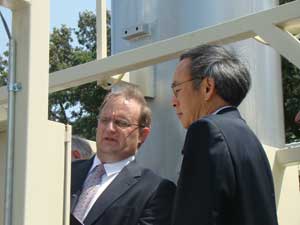Secretary Chu examines modular ethanol production system

September 15, 2009
BY Erin Krueger
U.S. Energy Secretary Steven Chu examined three Minnesota renewable energy projects in August, including a mobile self-contained ethanol plant developed by Welcome, Minn.-based Easy Energy Systems Inc.
The technology, trademarked as the Modular Ethanol Production System, is a self-contained, fully-automated ethanol production system that is pre-built in Easy Energy System's factory and shipped to the end user.
Company CEO Mark Gaalswyk compares the MEPS system to a set of Legos. Each production module is formed by a set of easy-to-assemble pods, each of which serves a different function. Some pods facilitate distillation, while others produce heat, pretreat feedstock or complete the fermentation process.
"The pods are interchangeable," Gaalswyk said. "They can be pulled out and replaced with improved technology as the technology changes." For example, Easy Energy Systems offers a variety of pods that can be used to produce heat to fuel the production process, including those designed to burn natural gas, biomass, sugarcane bagasse or methane. If a facility currently powered by natural gas chooses to implement a renewable source of power, the natural gas pod can easily be removed and replaced with one that burns biomass.
Together, the pods form a modular production unit, which can vary in size from 500,000 gallons per year to 5 MMgy. The production modules can be combined to configure a production plant of nearly any size.
The modules can also be designed to process a wide range of ethanol feedstocks. The company offers an add-on pod that can be used to convert a traditional first-generation MEPS to second-generation fuel production.
Gaalswyk said that the MEPS' small-scale modular design is able to address the Achilles' heel of cellulosic ethanol production; the logistical challenges of transporting and storing bulky cellulosic feedstocks. "Our feeling is the answer will be distributed ethanol plants that are fully automatic and economical to build," he said. Gaalswyk said he expects the purchase price of a 1 MMgy cellulosic METS will cost between $4.5 million and $5 million.
"We felt that to be able to do this economically, we had to be able to build the [systems] in our factory and ship them out like peas in a pod," Gaalswyk said. The prebuilt, easy-to-assemble nature of the MEPS will also allow his company to better serve the international market. "There are many opportunities in developing nations where you don't send 100 people to go stick-build a plant," he said. "Each one of our pods is about the size of a shipping container, and we can just ship it out and they can assemble the pods."
The technology, trademarked as the Modular Ethanol Production System, is a self-contained, fully-automated ethanol production system that is pre-built in Easy Energy System's factory and shipped to the end user.
Company CEO Mark Gaalswyk compares the MEPS system to a set of Legos. Each production module is formed by a set of easy-to-assemble pods, each of which serves a different function. Some pods facilitate distillation, while others produce heat, pretreat feedstock or complete the fermentation process.
"The pods are interchangeable," Gaalswyk said. "They can be pulled out and replaced with improved technology as the technology changes." For example, Easy Energy Systems offers a variety of pods that can be used to produce heat to fuel the production process, including those designed to burn natural gas, biomass, sugarcane bagasse or methane. If a facility currently powered by natural gas chooses to implement a renewable source of power, the natural gas pod can easily be removed and replaced with one that burns biomass.
Together, the pods form a modular production unit, which can vary in size from 500,000 gallons per year to 5 MMgy. The production modules can be combined to configure a production plant of nearly any size.
The modules can also be designed to process a wide range of ethanol feedstocks. The company offers an add-on pod that can be used to convert a traditional first-generation MEPS to second-generation fuel production.
Gaalswyk said that the MEPS' small-scale modular design is able to address the Achilles' heel of cellulosic ethanol production; the logistical challenges of transporting and storing bulky cellulosic feedstocks. "Our feeling is the answer will be distributed ethanol plants that are fully automatic and economical to build," he said. Gaalswyk said he expects the purchase price of a 1 MMgy cellulosic METS will cost between $4.5 million and $5 million.
"We felt that to be able to do this economically, we had to be able to build the [systems] in our factory and ship them out like peas in a pod," Gaalswyk said. The prebuilt, easy-to-assemble nature of the MEPS will also allow his company to better serve the international market. "There are many opportunities in developing nations where you don't send 100 people to go stick-build a plant," he said. "Each one of our pods is about the size of a shipping container, and we can just ship it out and they can assemble the pods."
Advertisement
Advertisement
Upcoming Events





